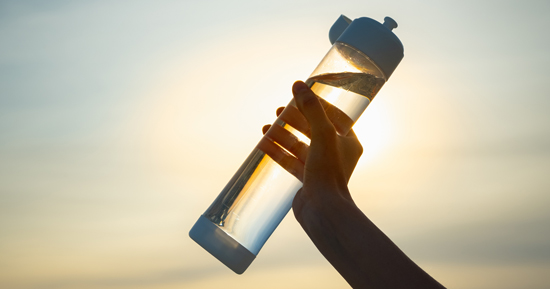
You may have heard that everyone should drink eight glasses of water a day. Although that advice is reasonable, it does not consider everyone’s individual needs, like their health, activity level, environment and other factors.
Up to 60% of our bodies are made of water. We lose water constantly through our skin, urine, waste and sweat – even when we breathe. Water intake has many benefits, including:
- Regulating internal body temperature
- Metabolizing food and regulating hunger
- Lubricating joints
- Flushing bodily waste
- Producing adequate saliva
If you don’t drink enough water, you can become dehydrated, which can lead to impaired kidney function, unbalanced electrolytes and other complications.
How much water should a person drink in a day?
About 20% of our daily fluid intake comes from the food we eat and the rest from the liquids we drink.
The amount of water intake you need depends on the sex you were assigned at birth. According to the U.S. National Academies of Science, Engineering and Medicine, men should drink 3.7 liters (about 16 cups) and women 2.7 liters (about 11 cups) of fluid per day. You need to drink even more water if you exercise, sweat or have an illness (diarrhea, vomiting, fever).
Although rare, it is possible to drink too much water. An excess of water can be lethal, especially to those with heart disease or electrolyte abnormality. The best bet is to clear with your physician what level of water intake is most appropriate for your body and activity level.
Tips for staying hydrated
- Drink a glass of water first thing in the morning. This gets your metabolism running and gives you an energy boost. Avoid drinking water right before bed if you struggle with nocturnal urination or heartburn.
- Invest in a fun or fancy water bottle. A good water bottle can serve as a visual reminder to drink more water throughout the day. Certain bottles have marked measurements for tracking intake or have words of encouragement printed on the side as water levels go down.
- Use alarms or notifications to your advantage. Set alarms or notifications on your smart devices as reminders throughout the day. For a mental boost, set your Alexa or Google device to remind you along with verbal, positive encouragements.
- Focus on your body's signals. Be mindful of whether your body is thirsty or hungry. Sometimes we overeat because we mistake thirst for hunger.
- Drink a glass of water before each meal. It will help you stay hydrated, help your body digest food better and help you feel full faster.
- Add calorie-free flavoring. Try fruit or vegetable infusions in your water to make it more appealing. Prepare a jug in the refrigerator to infuse overnight to make filling your water bottle in the morning easier. Pick up a water bottle that has a built-in infusion basket for flavor on the go.
- Check the color of your urine. Some people check the color of their urine throughout the day to ensure it is clear or light-colored. Dark yellow urine may be a sign of dehydration for some.
- Swap high sugar drinks for sparkling water or seltzer. Not only will you cut back on unnecessary sugar, but you'll be adding to your water intake.
- Set a daily goal. A simple daily goal can help you stay motivated and work towards maintaining a healthy habit.
- Make it a challenge. Ask your friends to join you in a healthy competition to see who meets their daily goals regularly.